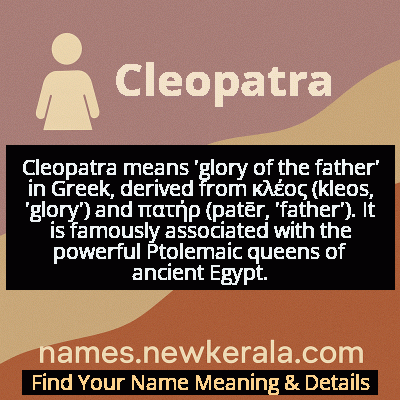Cleopatra Name Meaning & Details
Origin, Popularity, Numerology Analysis & Name Meaning of Cleopatra
Discover the origin, meaning, and cultural significance of the name CLEOPATRA. Delve into its historical roots and explore the lasting impact it has had on communities and traditions.
Name
Cleopatra
Gender
Female
Origin
Greek
Lucky Number
1
Meaning of the Name - Cleopatra
Cleopatra means 'glory of the father' in Greek, derived from κλέος (kleos, 'glory') and πατήρ (patēr, 'father'). It is famously associated with the powerful Ptolemaic queens of ancient Egypt.
Cleopatra - Complete Numerology Analysis
Your Numerology Number
Based on Pythagorean Numerology System
Ruling Planet
Sun
Positive Nature
Leaders, ambitious, highly driven, self-reliant, innovative.
Negative Traits
Overly aggressive, domineering, impatient, selfish.
Lucky Colours
Red, orange, gold.
Lucky Days
Sunday.
Lucky Stones
Ruby, garnet.
Harmony Numbers
2, 3, 9.
Best Suited Professions
Entrepreneurs, managers, engineers.
What People Like About You
Courage, determination, leadership.
Famous People Named Cleopatra
Cleopatra VII Philopator
Pharaoh of Egypt
Last active ruler of Ptolemaic Egypt who maintained Egyptian independence through political alliances with Roman leaders
Cleopatra Thea
Seleucid Queen
Influential ruler of the Seleucid Empire during the Hellenistic period
Cleopatra Selene II
Queen of Mauretania
Promoted cultural exchange between Egyptian and North African traditions
Cleopatra of Macedon
Macedonian Princess
Sister of Alexander the Great who played significant political roles
Name Variations & International Equivalents
Click on blue names to explore their detailed meanings. Gray names with will be available soon.
Cultural & Historical Significance
Extended Personality Analysis
People named Cleopatra are typically associated with strong, charismatic personalities marked by intelligence, ambition, and natural leadership qualities. They often possess a magnetic presence that draws others to them, combined with strategic thinking and diplomatic skills that make them effective in positions of influence. These individuals tend to be highly educated, culturally aware, and sophisticated in their tastes, with an appreciation for history, art, and intellectual pursuits. There's often a dramatic flair to their personal style and self-expression, reflecting the name's association with grandeur and theatricality. They are typically perceived as confident, self-assured individuals who value independence and are not afraid to challenge conventions. At the same time, the name carries expectations of emotional depth and complexity, suggesting someone who experiences life intensely and forms powerful personal connections. The combination of intelligence, charm, and determination makes Cleopatras natural leaders who can inspire loyalty and navigate complex social dynamics with remarkable skill.
Modern Usage & Popularity
In contemporary naming practices, Cleopatra occupies a unique position as a historically significant name that commands attention while remaining relatively uncommon. Modern usage trends show that parents who choose this name typically value classical education, historical awareness, and strong female role models. While the full name Cleopatra appears infrequently on birth certificates—ranking outside the top 1000 names in most English-speaking countries—its shortened forms like Cleo have seen a significant resurgence, entering the top 500 names in several countries. The name maintains particular popularity among families with Greek, Egyptian, or classical education backgrounds, as well as parents seeking distinctive names with powerful historical associations. Recent years have shown increased interest in the name as part of a broader trend toward reviving classical and mythological names, though its length and strong associations mean it's often reserved for parents specifically seeking its dramatic historical weight. The name continues to be used in literature, film, and popular culture, ensuring its recognition across generations.
Symbolic & Spiritual Meanings
Symbolically, Cleopatra represents the ultimate convergence of power, intelligence, and feminine mystique, serving as a multifaceted symbol across different cultural contexts. The name embodies the concept of cultural hybridity, representing the meeting of Greek rationality and Egyptian spirituality, Eastern mystery and Western political sophistication. It symbolizes female authority that operates outside traditional power structures, using intelligence, education, and personal relationships as tools of influence. Cleopatra also represents tragic ambition and the complex relationship between personal desire and political responsibility, making her a symbolic figure for discussions about the costs of power. In modern symbolism, she has been reclaimed as an icon of female empowerment, representing women who refuse to be limited by gender expectations and who navigate male-dominated spaces with intelligence and strategic thinking. The name carries connotations of exotic beauty, luxury, and timeless elegance, while also symbolizing the enduring power of education, multilingualism, and cultural awareness as sources of personal and political strength.

